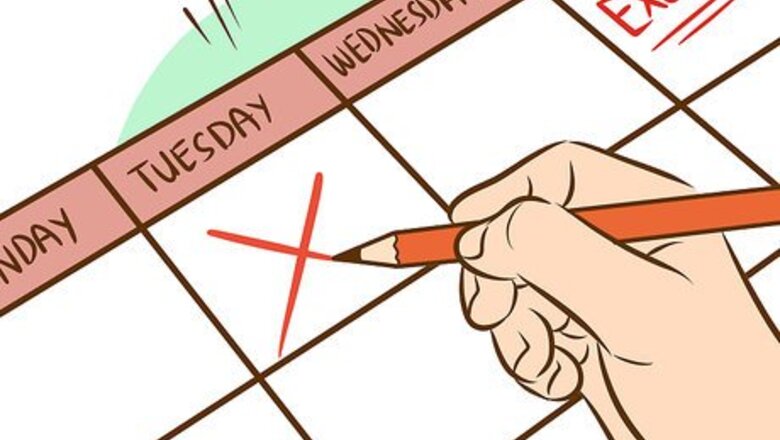
views
Preparing to Study
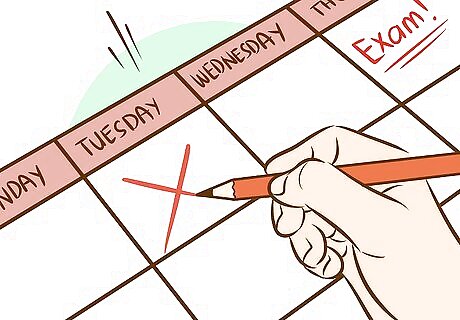
Start studying early. Give yourself more than enough time to review the material that was covered in class. You might want to gauge how soon to start studying by how much material you need to review. For instance, if you have to review material for an entire semester, you might want to start studying a few weeks prior. However, if you are just taking a test that covers material over a few chapters, a week prior or even three to four days may be sufficient. Only you know how long it takes you to study, so you are the best judge of when to start studying. If the class material is especially difficult for you, start studying early. Give yourself enough time to truly grasp the material, practice it and then review it. Get a full night's sleep before the exam. Your brain needs time to subconsciously digest everything you've put into it, so start early so you don't have to stay up all night.

Read through the entirety of your notes that will be on the exam. It will refresh your memory of the material and help you remember what you learned. It will also help to make you aware of all the information in your notes, where it is located in your notes so that you know where to find them, and what might be missing from your notes. Decide if you think your notes are sufficient enough to study from. Did you miss any classes? Are some of your notes missing? If so, you might need to borrow someone else's notes.
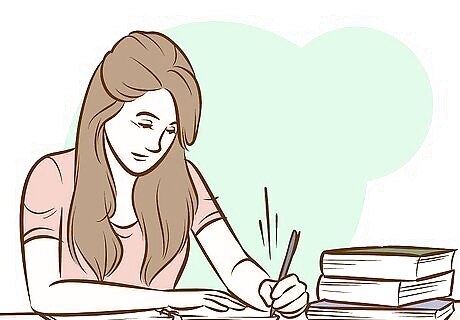
Get some good notes. If you're not a good note taker, or if there are “holes” in your notes, then ask a friend if you can copy his or her notes. Good notes can make all the difference when you're studying. They can explain content that the book doesn't explain well or highlight information and make it easier to understand and remember. If you only have five pages of notes, but your friend has twenty, then you probably missed some important information. Compare your notes to your friend's to see where the holes are in your notes.
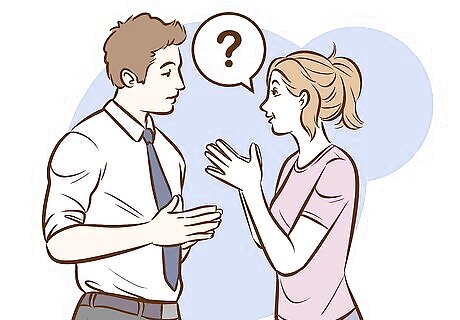
Ask your teacher about the test material. One of the easiest ways to begin your studying process is to find out what is on the test directly from your teacher. Many teachers will provide some guidance on what will and will not be covered on the test. Knowing which material the test will cover will help you focus on the main material that you need to study. Your teacher most likely won't tell you exactly what is on the test, but he or she might give you some pointers by handing you a study guide, or simply announcing what the exam will cover.
Reviewing the Information
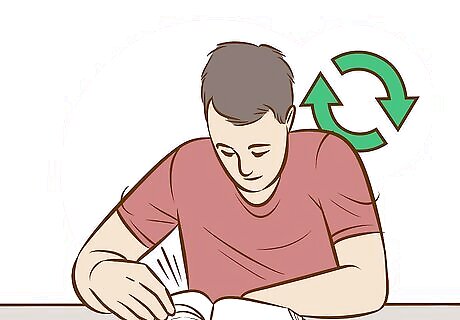
Re-read your notes. This time re-read your notes for understanding. In other words, you are going to study your notes. Start with the most basic information. So, if you're studying an art history unit on impressionism, make sure you know what impressionism means. Who were the most famous impressionists at the time? Ask yourself, who, what, where, when for each theme/subject matter that you are supposed to know for the test. You can look up information online to study from, but the best information to study from is the information presented to the class because the answers will be derived from your classroom materials. Sometimes information on the internet can vary from the information that you are presented in class. If you are planning to study from information provided on the internet, stick with sources that end with .edu or .gov. EXPERT TIP Ted Dorsey, MA Ted Dorsey, MA Academic Tutor Ted Dorsey is a Test Prep Tutor, author, and founder of Tutor Ted, an SAT and ACT tutoring service based in Southern California. Ted earned a perfect score on the SAT (1600) and PSAT (240) in high school. Since then, he has earned perfect scores on the ACT (36), SAT Subject Test in Literature (800), and SAT Subject Test in Math Level 2 (800). He has a BA in English from Princeton University and a MA in Education from the University of California, Los Angeles. Ted Dorsey, MA Ted Dorsey, MA Academic Tutor Remember to also study the topics that you're good at or know well. While you will definitely want to work on areas of weakness, you should also go back over your areas of strength. It can be easier to improve a grade by doing really well on a subject you're already good at than completely re-learning something that you don't know as well.

Take notes while you study. Yes, take even more notes. You can highlight and underline the information as well, but writing the information down really helps you retain it better. Make sure to write down concepts that you are struggling with or are having a hard time remembering. Break down complex subjects into steps or parts. For instance, if you are trying to learn the order of historical events, list out each event that happened in the order they happened. For instance, first Linus Pauling discovered DNA, then he was awarded a prize. Write down the time frame and the events that influenced each happening. Knowing these side notes should help you to recall information because they increase your level of understanding.

Review your syllabus. The syllabus is an outline of everything that you should have learned over the course of the class. It's a good place to start to understand major ideas and topics that you should be learning from the class. Review it and highlight the titles and subheadings. These are the sections that you'll need to at least review to make sure you understand the big ideas behind the topics. Some teachers write down the page numbers or chapters that each section of the syllabus pertains to in your book. Take note of those pages because you should definitely review them.

Write down the major topics and themes that you pulled out of the syllabus. Then, go through your notes to see if you have any notes at all on those topics. Once again, if you don't, you should ask someone for notes on those topics, and re-read the sections in the book pertaining to those topics. Anything outlined in the syllabus is usually “fair game” for test material.
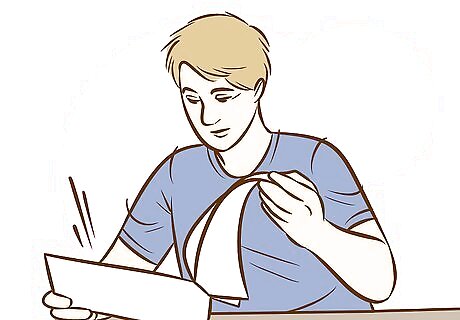
Review study guides and sections. In some books, each chapter has a short review or summary. This is a great place to quickly review and get a gist of a concept. Of course, if you have no idea what the summary is referring to or you need more details to jog your memory, refer to the study guide in the back of the book. Then, re-read those specific chapters or selections in the book that you were having trouble remembering. You might be able to find a study guide online for the material that you are studying if you are not able to get one from your teacher.
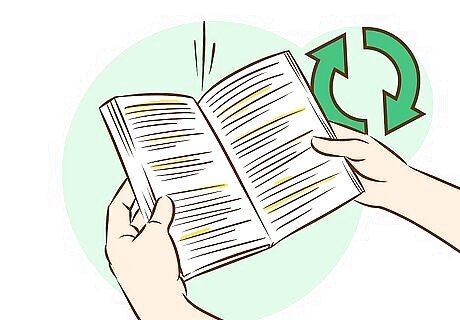
Re-read important selections of the textbook. All of the titled sections of the book from your syllabus should be re-read so that you can pull out important information. While you re-read these sections, keep in the mind the major concepts that you're supposed to be learning from those sections of the book. Write down important details as you read. Note the chapter titles and section titles as you read. They are a dead give away to the major concepts that are covered in those sections.
Preparing for the Exam
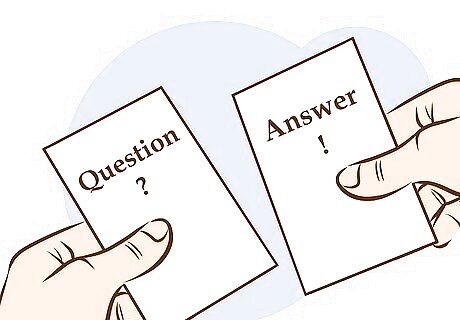
Make flash cards. After you have taken notes from studying all of your materials including the book and your notes, use that information to make flash cards. (Grab an index card, or cut paper into squares to use as a flashcard.) Turn statements into questions. For instance, if the statement is Linus Pauling was one of the discoverers of DNA, then write on the flash card the question, who was one of the main discoverers of DNA? Write the question on one side, and the answer on the other. Sometimes a question will spark an idea for a follow-up question. When you're making flashcards, often you'll be able to see how you may have forgotten to study something. For instance, who were the other discoverers of DNA? This question springs from the Linus Pauling statement because the word “main” reminds you that there were other people involved in DNA's discovery. If you don't know the answer to follow-up questions, then you should research the information and make flashcards for those questions too. Start making flashcards for the information that you are having trouble remembering or grasping. This is the information that you need to review the most. Then, move on to information that you already know pretty well. Making physical copies of flashcards is recommended because you have to write down the questions and answers, which is a repetitive process that will help you remember the information. Also, you can carry the flashcards around and use them at anytime. However, there are websites such as cram.com that allow you to make online flash cards.
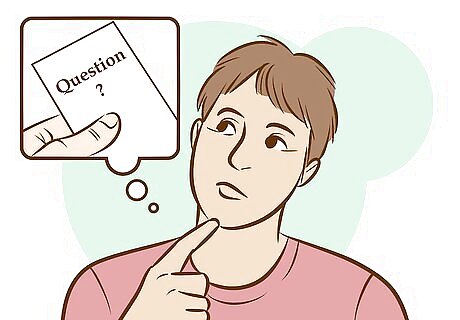
Quiz yourself. Once everything is written down on flashcards, quiz yourself with the cards. Keep reviewing the questions that you get wrong until you get them right. You can carry flashcards around with you and quiz yourself when you're on the subway or riding in the car. You might quiz yourself for a half hour or so, then take a break. Definitely continue to quiz yourself until your get them all right. If you keep getting certain questions wrong, review your notes and textbook again to see if there is something you're not understanding.

Do practice questions. This is especially helpful for subjects such as math. Practice doing the questions in the book that you were assigned for homework. Do extra questions in the back of the book. Re-do questions that you got wrong, and try to figure out why you got them wrong. Do practice questions until you feel more comfortable with subject matter. If you still have more time before your exam, ask for assistance either from a teacher or a friend.
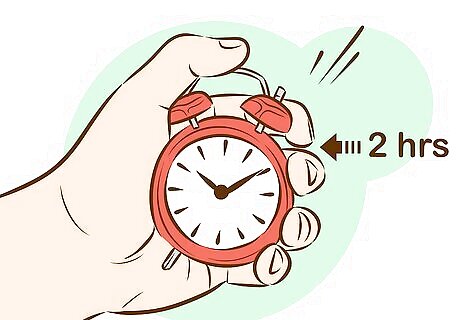
On the day of the exam, set your alarm at least two hours before the test. Scientists believe that a good night's rest is the key to better test scores. An hour and a half before the exam, start running through all the themes and sub-topics in your head. Like always, check your notes if you get stuck. Use your flashcards to help you commit all the tiny details to memory if they're not already memorized. Stop studying at least 15 minutes before the exam, but an hour is preferable. If you've given yourself enough time to study, you should feel well prepared and relaxed.
Determining Exam Questions
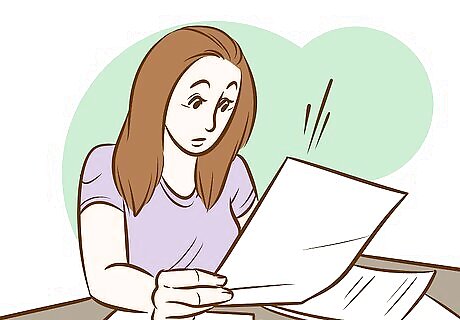
Review past tests. If you have a friend who has taken the test the year or semester before, ask your friend if you can see his or her test. Take note of the questions that were answered and the answers that were marked correct and incorrect. If you are in college, some universities keep past exams from classes on file. Contact your professor about reviewing them. Although reviewing past exams might not give you the exact questions that will appear on your test, it will give you an idea of how the information will be tested. It also will tell you how the test will be scored. You'll know if you should give long detailed answers or if your answers should be straight to the point. If you are able to review a test with answers on it, pay attention to answers that were given high marks and those that weren't. Also, pay attention to any notes in the margins that the teacher may have written explaining why points were taken off.
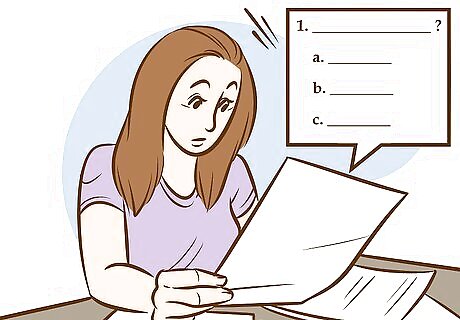
Determine the format. Reviewing past tests can help you understand the format of the test and whether it will be multiple choice, short answer or essay. It also gives you more ideas about how to study. Does it ask for specific information like dates and times that events occurred? Or is it testing big ideas with explanations in an essay format? If you understand the format of the test, you know what information to pull out and how detailed or open-ended it might be. You'll also be able to assess the distribution of points. Is the essay worth much more than the multiple choice? With the past test to review, you can assess what you've already studied and re-assess.

Go to class the day before the exam. Teachers usually provide more information about the test a day or two before the exam. Sometimes they might even tell you exactly what will be on the test and exactly what will not be, but not always. Your teachers may even provide you with a study guide to study from when they're giving away this information, and if you don't go, you'll miss out on it.
Forming Study Groups

Study with a friend. Get together with a friend or group of people from your class and study together. It doesn't have to be a formal study group. You can simply review each other's notes to see what you may have missed, and discuss concepts you think will be covered on the test.

Quiz each other. Ask each other potential exam questions. Use your flashcards to quiz each other, or ask your friend to make up new questions that you didn't think about. Even if you use the same questions that you wrote on your flashcards, you will find that the experience is different when your friend is quizzing you. More than likely, your friend will hold you accountable for answering the question in its entirety.

Chat about the concepts. Sometimes you can learn more about the information by simply discussing the concepts in a conversation with someone other than your teachers. It may help you understand the information in a different way, and it might even deepen your understanding. Bring snacks for the group or meet at a coffee shop and make the study group more casual, relaxed, and fun.



















Comments
0 comment